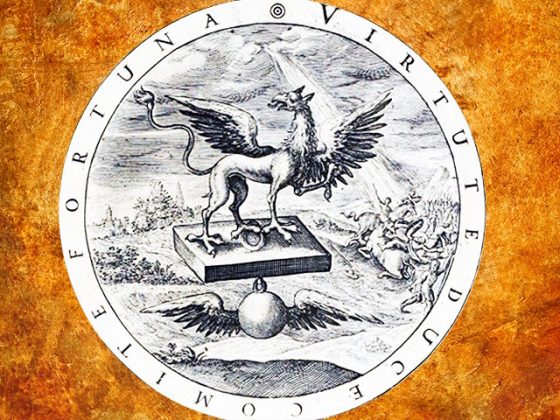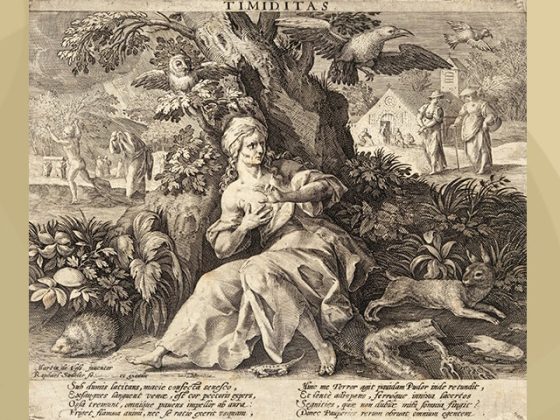Queridos amigos/as:
I send you this forty-fifth emblem from Daniel Cramer's book of emblems entitled…
…NIL SIT IN ORE, QVOD NON PRIUS IN SENSU

This emblem belongs to the collection called Octoginta emblemata moralia nova ─'Eighty new moral emblems'─, which was published in Frankfurt ─Germany─ in 1630.
The first sentence tells us:
Qvis dabit ori meo custodiam, et super labia mea signaculum certum, & non cadam?
Translation: ‘Who will put a guard over my mouth and a sure seal over my lips that I should not fall?'
This, patient readers, is a quotation from the book Ecclesiasticus or Sirach, which in Latin says:
Quis dabis ori meo custodiam et super labia mea signaculum aptum ut non cadam ab ipsis, et lingua mea perdet me?
Translation: ‘Who will set a guard over my mouth, and an effective seal upon my lips, so that I may not fall because of them, and my tongue may not destroy me?'
NIL SIT IN ORE, QVOD NON PRIUS IN SENSU.
Translation: ‘There is nothing in the mouth that has not been in the sense before.'
This phrase is a modification of an axiom of ancient Peripatetic ─Aristotelian─ philosophy, which reads: Nihil est in intellectu quod non sit prius in sensu, that is, ‘there is nothing in the intellect that has not previously been in the senses'. It could also be said that there is nothing in the understanding that has not been in the senses before.
The last sentence tells us:
Est sapiens cordis moderator et oris: in unum ergo vt conveniant, cor preme, claude labra.
Translation: ‘The wise man is a moderator of the heart and mouth, therefore, that for them to be united in one, control your heart and close your lips.'
Dear reader, our teachings insist on the need to moderate the word, the verb, because, although it may seem strange, the word is connected to sex, and when someone has completed THE GREAT WORK, everything is resumed in the POWER OF THE WORD. Therefore, we have to be careful about how we use our verbal power.
Saint James the Apostle, the Patron of the Great Work, tells us in his universal epistle things like these: “Look at the great ships, enormous, and yet the one who steers them is a small rudder; likewise, our body, even if it is large, must know how to control that small piece of flesh that is our tongue.”
The verb, misused, can light great fires in the minds of our fellow human beings. Let us observe how the two great world wars that have preceded us in history were stoked by the evil words of many of their protagonists. Gossip, “hearsay, slander, gratuitous insults, all of this is part of the diversion of the word into dark labyrinths.
On the other hand, the V.M. Samael told us well in his conferences: the heart, the magnetic center of the cardia, is also a poisonous lair of many aggregates that cloud our Consciousness and make us fall down the path of error. There are there, in the center of the heart, sentimentaloid-lustful aggregates, aggregates of resentment, of malice towards our neighbor, etc., etc., etc., which we must carefully examine so as not to be deceived by the false feeling of the “I”.
This is the reason why we see in this engraving a woman hammering a heart, using the hammer of the will to prevent the psychological aggregates that we have commented on in previous lines to lodge in it.
In the mouth of this woman we also see a padlock with which she wants to make sure that she does not talk for the sake of talking, and in this way she has her verb, her word, under control.
The blessed White Lodge demands of its Adepts to be careful with the word, since it is always charged with certain vibrations that can be benign or malignant.
In the lower part of the place where this woman works we can also see tongs and other instruments typical of those who work in the blacksmiths.
I end the explanation of this engraving with some appropriate sentences to be reflected:
“The word is mightier than the cannon.”
José de la Luz y Caballero
“What a prodigious transformation that of words, meek, inert, in the vulgar kind of flock, when they are summoned and commanded by the genius of the artist!”
José Enrique Rodó
“It is better to suffer than to enjoy; that to enjoy is happiness, to suffer is refinement; to be enjoying God is delight, to suffer for Him is refinement.”
Quevedo
“We cannot avoid passions, but we can overcome them.”
Seneca
“Passion often makes the sanest man foolish, and the most foolish, sane.”
La Rochefoucauld
AGNUS DEI, QUI TOLLIS PECCATA MUNDI.
─‘Lamb of God who takes away the sins of the world'─.
KWEN KHAN KHU





